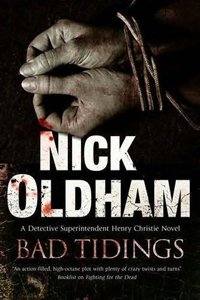 Written by Nick Oldham — It is a cold Lancashire New Year’s Day. Dark and early. Detective Superintendent Henry Christie of Lancashire CID is deeply asleep in his lady-friend’s bed. She is a pub landlady, and is exhausted after several days of seasonal festivities. But as it always does, the phone rings, and Christie is called into work. He is already leaden-hearted. His mother is seriously ill in hospital, and he has inherited two murder cases which are as cold and unappetising as three-day-old turkey leftovers. The crimes have been dubbed The Twixmas Murders by the inventive tabloid headline writers. Both came to light in those strange, indeterminate days between Christmas and New Year.
Written by Nick Oldham — It is a cold Lancashire New Year’s Day. Dark and early. Detective Superintendent Henry Christie of Lancashire CID is deeply asleep in his lady-friend’s bed. She is a pub landlady, and is exhausted after several days of seasonal festivities. But as it always does, the phone rings, and Christie is called into work. He is already leaden-hearted. His mother is seriously ill in hospital, and he has inherited two murder cases which are as cold and unappetising as three-day-old turkey leftovers. The crimes have been dubbed The Twixmas Murders by the inventive tabloid headline writers. Both came to light in those strange, indeterminate days between Christmas and New Year.
As the the narrative switches backwards and forwards in time, we learn that one of the victims was David Peters. He was Mr Unremarkable. Owner of a few moderately successful computer repair shops, he was locked into a functional but loveless marriage. He occasionally found the energy to couple with the manageress of one of his shops, usually in a location as humdrum and as pastel-shaded as his life.
The highlight of Christine Blackshaw’s CV was that she managed to hold down a job at ASDA, so why on earth was her body found in a wheelie bin, tortured, burned and shot? That both these bodies had been found with dirt and chicken feathers stuffed in their mouths was a link that even the dullest detective could not fail to notice, and although he may have many faults, Henry Christie is far from dull. “It’s Christmas time – there’s no need to be afraid…” But Christie is very afraid. Afraid that it’s that time of year again, and The Twixmas Killer is due to strike again.
As Christie tries to deal with a potential death in his own family, he uncovers an enigmatic and tenuous connection to a village school, many years ago, and a fading school photograph reveals some surprising faces. While he and his reluctant colleagues DI Rik Dean and DC Jerry Tope seem to be the only coppers in the North West who are on duty, they become embroiled in a vicious turf war between two crime families who are deadly rivals. Just in case you thought Blackpool was all about golden sands, kiss-me-quick hats, saucy postcards, donkey rides and innocent fun, Oldham is happy to disabuse you.
Oldham knows every highway and byway of his particular part of Lancashire, and the police background is thorough without being intrusive. My only quibble about what is otherwise an excellent book is the author’s use of flashbacks. As a narrative device it is best used sparingly, but I found the constant darting back and forth disconcerting, even though the central action takes place over a relatively short space of time.
That said, Henry Christie is one of the more appealing of contemporary coppers in crime fiction. He has no deep seated psychoses or complexes, rarely agonises about his job, and is reassuringly human. A big plus for me is that Oldham brings Christie to life as a warm and decent man without resorting to outlining his hero’s taste in music at every available opportunity and presenting a virtual card index of his CD collection. The parallel story about what is going on in Christie’s family life is well observed and, on occasions, very moving. There is enough action, enough compassion, and enough wry humour in Bad Tidings to satisfy existing Henry Christie fans, and new readers will soon be searching for the back catalogue.
Severn House
Print/Kindle
£11.15
CFL Rating: 4 Stars








